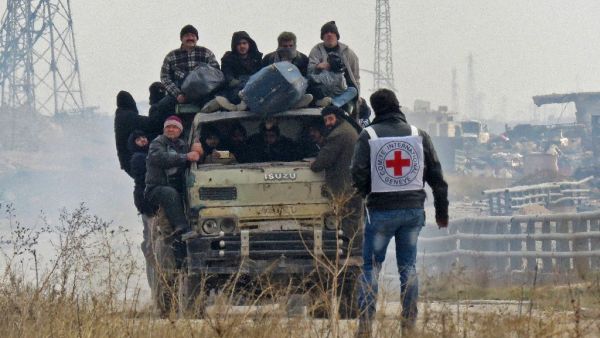The evacuation of civilians and rebel fighters from the last opposition enclave in eastern Aleppo came to a halt Friday, a day after the operation started under a Russian-Turkish agreement.
A Syrian lawmaker said the evacuations in Aleppo stopped after a dispute broke out over the fate of two pro-government villages besieged by rebels in the north-western province of Idlib.
"The operation has been suspended because of Foua and Kefraya. The insurgents are not letting people out from there," lawmaker Feras Shehabi told dpa.
Opposition sources said that rebels had agreed to allow about 400 sick and wounded people to leave the two encircled villages, where tens of thousands live, but did not say when the evacuations would take place.
In eastern Aleppo, officials in Russia said more than 9,500 people, including 4,500 militants, have been evacuated in the past two days.
Moscow, a key ally of the Syrian regime, claimed that the only people who remain there "are groups of radical and irreconcilable militants firing at Syrian troops."
"All women and children in neighbourhoods controlled by militants have been evacuated," the Russian Interfax news agency quoted the Russian state authority on peace efforts in Syria as saying.
The executive director of UNICEF said while 2,700 children have been evacuated from the city, hundreds more remain trapped there.
"We are extremely concerned about their fate," Anthony Lake said. "If these children are not evacuated urgently, they could die."
A convoy carrying 900 rebels with their families returned to eastern Aleppo after the evacuation was suspended, a Syrian military official said without giving details.
An activist, still inside the enclave, said that regime forces intercepted one bus and ordered that all men on board to get off.
"One guy who tried to resist them, they shot him dead and four others," the activist, going only by the first name of Ahmed out of security concerns, added.
"Many lives are still at risk," another activist, who is still in eastern Aleppo, said in a WhatsApp message.
The Syrian regime and the opposition traded blame for halting evacuations from eastern Aleppo.
Syrian state news agency SANA said buses waiting at a crossing point to ferry evacuees had come under sniper fire from rebels. No casualties were reported.
The agency also accused the rebels of breaching the evacuation agreement by smuggling heavy weapons and taking kidnapped people with them as they left eastern Aleppo.
Yasser al-Youssef, from the rebel group Noureddine al-Zinki, accused the regime and its allied Shiite militiamen of blocking the passage of an evacuation convoy from eastern Aleppo.
The Syrian forces have imposed a siege on the opposition section of eastern Aleppo since July, amid reports of severe shortages of food and medical supplies in the area.
In his last press conference before his term expires on December 31, UN chief Ban Ki-moon said Aleppo had become "a synonym for hell," and expressed regret over the world's collective failure to stop the war.
"This is an issue of ... people just sticking to a very narrow personal or national interest - that has been killing hundreds of thousands of people now, that we have to reject in the name of humanity," Ban said.
Also in New York, US ambassador Samanta Power said Washington supports a French proposal to deploy UN observers to monitor the evacuation of Aleppo and that vote in the Security Council could come within days.
Vitaly Churkin, Russian ambassador to the UN, called the plan "questionable."
"It takes weeks to deploy observers," Churkin said. "They need to be trained people who know what they're doing, what they are monitoring and how those things need to be monitored - to imagine that you can do it within two or three days is really unrealistic."
More than 300,000 people are estimated to have been killed in Syria’s conflict that started in March 2011.
The capital Damascus has since seen several attacks.
On Friday, three policemen were seriously injured in a suicide attack that hit a police station in the southern Damascus district of al-Midan, a security source said.
The attack was carried out by a 10-year-old girl, the source added on condition of anonymity.
"The child [first] stood crying outside the station, claiming she was lost," the source said.
"When a policeman brought her into the station, she detonated herself."
In January 2012, 25 people were killed in a suicide attack in the same district.








